|
|
|
Sort Order |
|
|
|
Items / Page
|
|
|
|
|
|
|
| Srl | Item |
| 1 |
ID:
108058
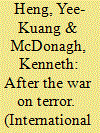

|
|
|
|
|
| Publication |
2011.
|
| Summary/Abstract |
In March 2009, the Obama administration sent a message to senior Pentagon staff instructing them to refrain from using either of the terms 'Long War' or 'Global War on Terror' and to replace these terms with 'Overseas Contingency Operations'. The change in tone and, potentially, substance, from the Obama White House by ending the 'war on terror' at the rhetorical level suggests a need to shift our academic attention towards developing more appropriate analytical frameworks for examining alternative strategies for countering terrorism. This paper seeks to explore what it terms an emerging risk-based approach being deployed by states. Our framework proposed here deploys the twin concepts of 'risk bureaucracies' and risk regulatory regimes (RRRs) in examining terrorist financing and aviation security regulations.
|
|
|
|
|
|
|
|
|
|
|
|
|
|
|
|
| 2 |
ID:
108059
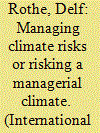

|
|
|
|
|
| Publication |
2011.
|
| Summary/Abstract |
Current international climate governance from a risk-political perspective points to a paradoxical moment in world risk society. While the probability of negative climate impacts increases and we can see the emergence of a common risk perception among international decision-makers, nation states in the international climate regime fail to agree on effective preventive measures that could mitigate the harming effects of global warming. While at the discursive level climate change is constructed as one of the major risks in the twenty-first century, the focus in international climate governance remains on voluntary measures and market-based instruments. Drawing on discourse theory, this paradox can be explained as the outcome of a discursive struggle in climate politics. Risk, in this perspective, is a political technology to govern the future that is embedded within broader political rationalities. Until 2007, risk management in climate governance was established as a form of advanced liberal government based on individualisation and self-responsibility. The growing consensus on dangerous climate change ultimately reinforces this advanced liberal risk management by presenting climate change as a 'naturalised' de-bounded risk and blurring its socio-economic causes.
|
|
|
|
|
|
|
|
|
|
|
|
|
|
|
|
| 3 |
ID:
108056
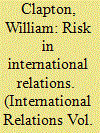

|
|
|
|
|
| Publication |
2011.
|
| Summary/Abstract |
Risk is a concept that has recently filtered through into International Relations (IR). However, the literature on risk, risk management and IR is still comparatively small and there is still significant scope for the theorisation of these concepts in an IR context. Thus far, the literature on risk and IR has been largely characterised by the debate between critical realist, constructivist and post-structuralist approaches to risk. At the core of these debates is the ontological question of whether risks are 'real' or not. However, this article will suggest that these ontological debates have grown stale and are unhelpful to furthering the research agenda on risk and IR. As this article will demonstrate, we need to systematically develop ways for both explaining risk identification, assessment and management -what might be termed 'riskisation' - and why particular forms of risk management emerge in particular situations and not others.
|
|
|
|
|
|
|
|
|
|
|
|
|
|
|
|
| 4 |
ID:
108055
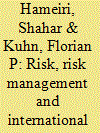

|
|
|
| 5 |
ID:
108061
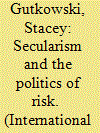

|
|
|
|
|
| Publication |
2011.
|
| Summary/Abstract |
Little has been said in the international relations (IR) literature so far about the connections between secular ideas and identification of risk. However, there are striking parallels. 'Western', secular discourse(s) have framed Islamist terrorism as slippery, uncontainable, mysterious and strange. Similarly, risks are often described as 'diverse, amorphous and qualitative'. Starting from this observation, this article explores connections between ongoing conversations about the politics of risk and insights from the emerging literature on secularism and international politics. Using the British 'Prevent' agenda of 2005-09 as a case study, it asks how it is that political secularism and cultural secularity have contributed to perceptions of danger emanating from the Muslim population. It explores the potential implications of these perceptions for state security policy. The article also explores Foucault's account of pastoral governance as a potentially useful framework for scholars of risk, particularly for describing the ambivalence inherent in much risk-management practice.
|
|
|
|
|
|
|
|
|
|
|
|
|
|
|
|
| 6 |
ID:
108062
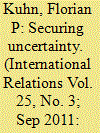

|
|
|
|
|
| Publication |
2011.
|
| Summary/Abstract |
The theoretical concept John Herz called a 'security dilemma' has rarely been applied to sub-state social figurations, although security dilemmas do shape political behaviour in post-conflict peacebuilding. Comparable to state formation, sub-state groups develop institutional capacities. Often led by 'warlords' or 'strongmen', these entities resemble states within, while lacking recognition and legitimacy from without. Between these entities arises a sub-sovereign form of security dilemma. It is a result of uncertainty about the other's motives regarding expansion, control of sources of funding, or domination within the legal order of the 'state'. When statebuilding is pursued by external actors, aiming to fill the legal void, the 'state' can become a source of existential risks for sub-state entities. Risks - from extinction to the transformation of a group's socio-political identity - can stem from another sub-state group taking over the state, appropriating superior means of coercion and hence enabling itself to subjugate others; relative deprivation concerning external funding or revenue from trade or smuggling; or loss of investment in networks of patronage, favourable terms of trade, or monopolies for certain goods. External support adds considerable uncertainty about interventionists' capabilities, willingness and ability to steer and control statebuilding efforts. This article explores how risks and their perception shape interaction between social actors and at the same time how awareness and consideration of these risks may influence external actors' behaviour. It argues that understanding risk constellations within an intervention and their processual transformation is vital for external statebuilding support.
|
|
|
|
|
|
|
|
|
|
|
|
|
|
|
|
| 7 |
ID:
108063
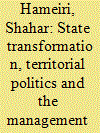

|
|
|
|
|
| Publication |
2011.
|
| Summary/Abstract |
The perceived emergence in recent years of potentially cataclysmic transnational risks has been a growing concern for policymakers and practitioners, as well as an area of considerable scholarly interest. Existing sociological approaches to the study of risk, which have become influential in a range of related social scientific fields, highlight important dimensions of this phenomenon, but are unable to adequately explain why these risk depictions have emerged at this historical juncture. Nor are they capable of providing a systematic explanation for variation in the adoption of risk depictions and related modes of governance in different functional areas and geographic regions. Drawing on the insights of political economy and critical political geography, it is argued that the current preponderance of transnational risk depictions and associated modes of governance should be understood in the context of processes of state transformation, linked to the transnationalisation of finance and production, which challenge the fit between state power and national territorial borders. From this perspective, risk and risk management are mechanisms in a contested process of rescaling, in which governance functions traditionally associated with the national state are shifted to regional or even global modes of governance. Understanding the dynamics of this territorial politics is important for learning about the current and evolving nature of political rule within and beyond the state.
|
|
|
|
|
|
|
|
|
|
|
|
|
|
|
|
| 8 |
ID:
108057


|
|
|
|
|
| Publication |
2011.
|
| Summary/Abstract |
Frank Knight was one of the twentieth century's most illustrious economic thinkers. His writings and enquiry into the nature of method, theory and knowledge in relation to the activities of social actors, and under what circumstances and with what limitations we might adequately theorise social agency, bequeathed a rich tradition of theoretical and practical insight. Many of his writings centred on the issue of risk and uncertainty, how social actors anticipate the future and manage and mediate terrains of uncertainty and risk, and in doing so change the outcomes that obtain. Knight's contributions essentially constructed a means for assessing and measuring risk in various facets of social activity, seeding insights which remain pertinent today. As the article notes, however, despite Knight's insights and the methodological schema he constructed for probability analysis, remarkably few social sciences - including international relations - have mined his work. Ironically, much that we need to know to more effectively theorise and accommodate the conundrums of risk and uncertainty into social scientific methods Knight long ago handed down to us.
|
|
|
|
|
|
|
|
|
|
|
|
|
|
|
|
|
|
|
|
|